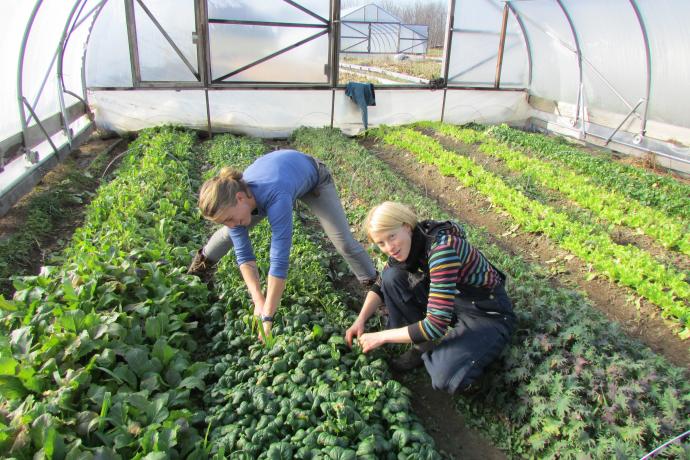Sowing Organic, Regionally Adapted Seeds to Thrive in the Northeast
Published 04-23-14
Submitted by Fruition Seeds

winter greens
Fruition Seeds, a new company in western New York, is customizing organic seed to thrive in the local conditions of the Northeast so that growers and consumers have continued access to the food they love. This is the second year of customized seed production for co-owners and seed farmers Matthew Goldfarb and Petra Page-Mann.
“Customizing seed ensures our crops can adapt year after to year to a changing climate,” says Goldfarb. “Not only will our seeds perform better but the process of working with local farmers will also ensure we are making the right choices when it comes to social, cultural and environmental values. We are developing seed not just for today but for our future generations.”
The selection and breeding of seed for specific traits is a process as old as human civilization. However, most seed available to today’s home gardener is grown in climates favorable to commercial dry seed production (the Pacific Northwest and Israel) and not climates that reflect the variety of local growing conditions. Much of this commercial seed is adapted to modern agricultural techniques focused on mechanization and increased external inputs; breeding for resistance to pests and disease is rarely prioritized because the assumption is growers will rely heavily on chemical applications. Home gardeners may be buying good seed but not seed selected to naturally excel in their specific climate, soils and conditions.
Fruition Seeds’ innovative model of producing the highest quality seed is done through a collaboration with regional small-scale growers to select and breed specific traits for each crop by combining the growers’ talents in vegetable production and Fruition Seeds’ expertise in vegetable breeding.
Examples of this collaboration include: lettuces that won’t bolt in the heat; cabbages that store sweet and crispy throughout the winter; squash and cucumbers with inherent resistance to local diseases and pests; crops with excellent germination in cold soils; and new shapes, colors, and flavors that match local tastes.
“Customizing seed is not a gimmick,” says Goldfarb. “You will see and taste the difference.”
Italy Hill Produce, an organic farm run by Jonathan Hunt and Caroline Boutard-Hunt in Branchport, NY, plans
“Customized seeds will allow us to produce more, better food from the same amount of land with fewer inputs due to plants being better able to deal with local conditions and pests with less stress,” says Hunt.
Jeremiah Pacheco, owner and farmer of Squash Blossom Farm in Naples, NY, is part of Fruition Seeds’ collaborative network of growers currently using and producing customized seed.
“As seeds adapt, taste thrives,” says Pacheco. “Customized seed ripens readily in our short Northeastern summers and this translates into more flavor, more nutrients, and more consumption.”
Fruition Seeds believes that its relationship with home gardeners is essential to successfully customizing seed. The company seeks input from small-scale growers and encourages them to ask questions about the seed they use: “Do I know who grows my seed? Do I know where the seed is produced? Will the seed be adapted to my local conditions? Am I allowed to save seeds from these crops? Will they grow true next season?”
“If you can answer yes to these questions, you are helping to build a wonderfully resilient future in your garden and your community,” says Page-Mann.
Customization of seed is an on-going process. Because regional growing conditions will continue to change, seeds must also change in order to produce dependable and delicious food. Fruition Seeds’ goal is to provide growers with seed that consistently thrives in the ever-changing local environment.
“Quality of seed is the long standing value for us,” says Page-Mann.
Home gardeners and market farmers can buy seed directly from Fruition Seeds and contact the company through its website, www.fruitionseeds.com.
About Fruition Seeds
Fruition Seeds believes that the foundation of resilient agriculture and community begins with the seed. We improve, breed and grow regionally adapted, certified organic vegetable, herb and flower seed developed to thrive in the Northeast. We are committed to providing clear and accurate information about where our seed is produced. We are dedicated to meeting the need for dependable and delicious varieties for your gardens and farms. We believe a direct relationship with small-scale growers is essential to this process of customizing seed. We also collaborate with farmers and chefs to develop new varieties to meet their market and culinary needs. Come and join us. To learn more about Fruition Seeds, visit www.fruitionseeds.com.

Fruition Seeds
Fruition Seeds
Sow what?
Fruition Seeds believes that the foundation of resilient agriculture begins with the seed. We are a new type of seed company, developing organic seeds for our contemporary values and tastes to create tomorrow's heirlooms. We are dedicated to meeting the need for dependable and delicious varieties for your gardens and farms. We improve, breed and grow regionally adapted, certified organic vegetable, herb and flower seed developed to thrive in the Northeast. We believe a direct relationship with small-scale growers is essential to this process of customizing seed. We collaborate with farmers and chefs to develop new varieties to meet their regional market and culinary needs.What are the benefits of the seeds we provide?- Easier, more successful gardening! Our seeds are grown and selected to thrive in your local growing conditions.
- Increased diversity! We grow and breed organic, open-pollinated seed. No hybrid or GMO seed.
- Amazing flavor! We select for taste.
- Know your seed and know your farmer!
More from Fruition Seeds

